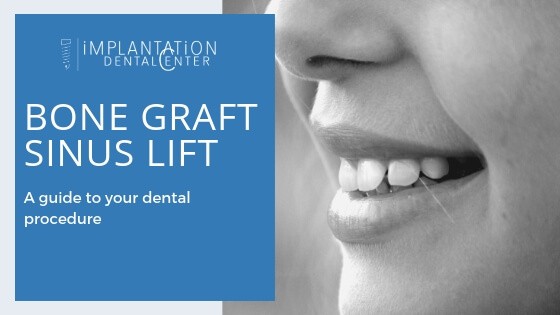Bone Grafting Sinus Lifts

What is a sinus lift?
A sinus lift is a type of bone graft used by a specialist when the top jaw isn’t quite tall enough. Sometimes a dentist will need to install dental implants, but they can’t actually get into that top jaw. Sometimes the sinuses are just too close together. In any event, a sinus lift can help correct the problem.
Since a sinus lift is a type of bone graft procedure, bone or bone substitute will be added to the roof of the mouth. The sinuses are separated to allow the surgeon to insert a piece of donor bone, bovine bone, porcine bone, or synthetic bone substitute into the top jaw.
Why would a patient need a sinus lift?
There are several reasons why a patient may need a sinus lift. Sometimes when teeth are lost, the bone that supports the teeth will shrink. When this happens on the top jaw, it can cause the sinuses to drift closer together. Sometimes bone can be lost due to periodontal (gum) disease. Still other cases involve a patient with a naturally small sinus.
What happens during a sinus lift procedure?
The surgeon will make a small incision in the place your back teeth used to be, raising up the flap of skin that covers the roof of your mouth. There’s a membrane that lines the sinus, and the surgeon carefully pushes that aside. Bone graft material is then placed into the space where your sinuses used to be. Over the next six to nine months, this material will fuse with your existing bone.
The procedure may sound a bit scary, but you’ll be comfortably sedated during the procedure, and your dentist will give you thorough instructions to help prevent discomfort during the healing process.
What Are the Different Types of Bone Grafts?
The type of bone graft that you receive also serves as a factor during your recovery time, and each option has benefits and drawbacks for your recovery. During your consultation, we will make sure to go over each of these to help you decide which will offer you the best chances for a successful outcome after your surgery.
- Autograft-A portion of your own bone is used to rebuild the area of your jaw that is being treated.
- Allograft-The graft is performed using donated cadaveric bone that has been purified and screened to ensure that it is safe for grafting.
- Xenograft-The bone used during this procedure comes from an animal, and it is usually bovine. Similar to an allograft, the bone is treated using specialized processes that make it just as effective as human bone material for the surgery.
Recovering After a Bone Graft Surgery
Bone graft surgery is one treatment option that we offer to provide stability for dental implants or to minimize bone loss after an extraction. As with any type of oral surgery, your recovery depends upon factors such as the severity of the condition being treated as well as how well you can comply with the aftercare instructions.
How Long Should Recovery Take?
The average time for recovery from bone graft surgery can range anywhere from a couple of weeks to several months. Keep in mind that this time frame represents the primary healing period after which you should start to feel more comfortable around your teeth and gums. The bone graft itself will continue to heal over three months or more as it continues to fuse to the rest of the jaw bone.
What Can I Do to Ensure a Good Recovery
The first thing you should do is talk to your specialist about what you can do to prepare before the surgery to help your recovery. Lifestyle changes such as abstaining from smoking helps to promote proper blood flow to the surgical site and reduce the risk of infection.
After your procedure, you will need to take it easy and avoid extreme activities such as strenuous exercise or sports that drain your energy and increase the risk of injury. Finally, watch out for the signs of complications. While you will have initial swelling, it should go down over time. Any extreme pain, swelling or bleeding from the surgical site needs to be reported to immediately.
After a bone graft surgery, your recovery depends upon your understanding and following the after care instructions provided to you by Dr. Hervas and associates. Please give us a call at 954-476-0770 with any questions that you have before or after your bone graft surgery so that we can help you enjoy the best possible recovery.


